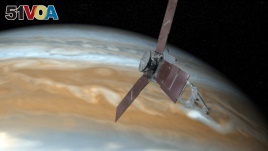25 August, 2019
A new study suggests that the planet Jupiter may have been hit a long time ago by a still-developing planet, one about 10 times the size of Earth.
Scientists believe the head-on crash took place not long after Jupiter was formed.
Scientists say such a violent collision could explain conditions inside the center of the planet.
A report on the study appeared in the publication Nature.
Astronomers believe the collision may have happened several million years after the formation of our sun. The solar system – made up of the sun and eight major planets – was formed about 4.6 billion years ago.

This undated image shows shows an artist's rendering of NASA's Juno spacecraft making a close pass over Jupiter. (NASA via AP)
Jupiter is massive - more than two times the size of all other planets in the solar system combined. Jupiter is a gaseous planet, made up mostly of hydrogen and helium. Scientists believe it took shape when gravity pulled in gas and dust left over from the sun's formation.
Researchers have long sought to understand more about Jupiter. In recent years, the U.S. space agency NASA has carried out research on the planet. NASA's Juno spacecraft, launched in 2011, uses instruments to measure the planet's gravitational and magnetic fields.
Juno has made interesting findings about Jupiter. It showed that Jupiter likely has a "diluted" center, one mixed with both light and heavy materials. In the past, scientists theorized that the planet likely had a dense, solid core.
In the latest study, researchers examined data and other measurements collected by Juno. They used this information to build models to predict what the planet's core is made of and how it is structured.
Their models supported the theory that a head-on collision took place between Jupiter and a still-developing planet. The team's findings suggest the object that hit Jupiter would have been about 10 times the size of Earth. Such a crash, involving the two massive planets, could have broken apart Jupiter's dense core and mixed light elements with heavy ones.
Andrea Isella is an astronomer with Rice University in Texas. He helped lead the research.
Isella said in a statement he was at first unsure about the collision theory when the idea was presented. "It sounded very unlikely to me," he said, "like a one-in-a-trillion probability."
But Isella said he began to support the theory when he saw calculations made by another researcher. That researcher was Shang-Fei Liu, an astronomer from China's Sun Yat-sen University. He said the calculations – which came from computer modeling methods – changed his mind that the theory "was not so improbable."
The study found there was at least a 40 percent chance that Jupiter would collide with a still-forming planet within its first few million years.
Isella said that scientists already believed such large collisions might have been common while the solar system was still developing. "For example, we believe that our moon formed after such an event," he told the Reuters news agency. "However, the impact that we postulate for Jupiter is a real monster."
Under the theory, the still-developing planet - also known as a protoplanet - would have been swallowed up by Jupiter. Liu said that if the collision had not happened, the protoplanet would have likely went on to become a massive gas planet in our solar system.
The researchers also suggest that a similar collision, involving the planet Saturn, may have happened while the solar system was still young. This may explain the structural differences that exist between Jupiter and Saturn, they said.
I'm Bryan Lynn.
Bryan Lynn wrote this story for VOA Learning English, based on reports from Reuters, Nature and Rice University. George Grow was the editor.
We want to hear from you. Write to us in the Comments section, and visit 51VOA.COM.
_________________________________________________________________
Words in This Story
diluted – adj. made weaker by mixing in something else
core – n. the center or most important part of something
calculation – n. a mathematical estimate of something
impact – n. the force with which one thing hits another
postulate – v. to suggest or accept that a theory or idea is true